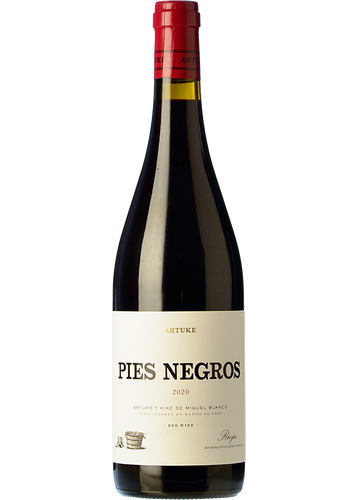| Type | Red wine |
|---|---|
| Region | |
| Grapes | |
| Producer | |
| Allergens | Contains sulfites |
| Alcohol contenti | 14.0% |
| Production | 60,000 - 65,000 bottles |

Artuke Pies Negros
2022Spec sheet
The wine
The name of the wine — Pies Negros, 'black feet' — is a homage to the tradition of grape-stomping, a tradition still alive and well at the Artuke Bodegas y Viñedos winery. Traditions like this together with the high altitudes of the vineyards deliver an excellent wine whose freshness and typicity give it its unique identity. A perfect wine to get to know the Tempranillo grape and rediscover the Rioja appellation.
What does this wine taste like?
Its cherry colour with violet hues shouts out its fruitiness. This wine is a treat, offering a certain complexity showing the balance between its juicy fruit and the tannins from the grape skin. Bitter delicacies add a touch of elegance to the essence of a simple grape, and make the Pies Negros a very moreish wine. Its aroma combines blackberries and liquorice with flowery hints of violets. Wide, lactic, and balanced on the palate.
| Light | Bold | |
|---|---|---|
| Smooth | Tannic | |
| Dry | Sweet | |
| Soft | Acidic |
Drinking and storing
Food pairing





Meat rice dishes / Iberian sausages / Magret of duck
Ratings and awards
| 2023 | 93 PK | |
|---|---|---|
| 2022 | 92+ PK | |
| 2021 | 93 PK | |
| 2020 | 92+ PK | 92 PN |
| 2018 | 93 PK | 93 PN |
| 2017 | 92 PK |
Wine critics reviewsReviews by Parker
Customer reviews
Winemaking
Grapes are hand-collected, destemmed, and crushed through stomping to start off the fermentation of the must. A small quantity of the wine undergoes malolactic fermentation in barrels before the finished wine is blended in different-aged wooden barrels to maintain the primary tones of the grape.
| Ageing period | 12 months |
|---|---|
| Barrel age | Used |
| Type of wood | French and American oak |
Vineyards
We can call the Pies Negros a village wine as all the grapes used in its production come from the small village of Ábalos, in the foothills of the Sierra Cantabria mountain range. The first vines were planted here on these chalky soils way back in the 1920s. Worked in an environmentally-friendly way at heights of 600 metres above sea level, the resulting wines capture the true character of the Atlantic.
| Vine age | Between 32 and 98 years |
|---|---|
| Soil | Calcareous-clay |
| Climate | Atlantic with Mediterranean influence |
| Yields | Low yields |
| Altitude | 600.00 meters |
The winery
Artuke, Bodegas y Viñedos

Artuke is a family-run winery owned by the Miguel Blanco family and located in the town of Baños de Ebro. It maintains 17 hectares of vineyards in the Rioja Alavesa, from where it produces wines with a distinct personality. Inheriting the tradition passed down from his forebears, Roberto decided to build the present winery in 1985, setting it up with the technology and equipment required for keeping wine production going and enabling it to cope with growing demand. Today, it...






















